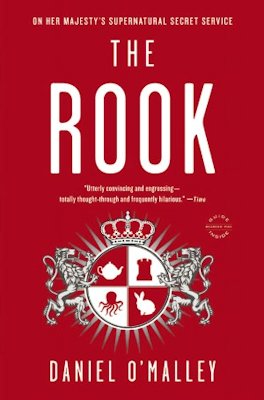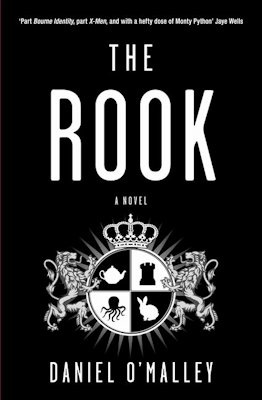Imagine you woke up one day unable to remember who you were. Without even the knowledge of your name, or what you did for a living—far less the little things like the food you enjoy eating, or the music you choose to listen to—I wonder, would you still be you? If our individual experiences of the world are what make us the men and women we are, and we forget these, are we still the same people?
Though this is its core conceit—familiar, yes, yet fresh in its execution—Daniel O’Malley’s distinctive debut has little time for such philosophical ponderings: The Rook does touch on the above, but it is much more interested in the action-packed aftermath of its protagonist’s identity crisis than the tenuous questions raised by her strange psychical transformation.
Given O’Malley’s intent, then, The Rook’s setting—in a United Kingdom plagued by secret supernatural set-pieces—is exemplary; its always-on pacing seems near ideal; and its quick-fire characterisation feels perfectly fit for purpose. Those in search of deep and meaningful reading would be best advised to avert their eyes, but presuming you can put aside your penchant for profundity, The Rook is an incredibly entertaining debut, with precious few pretensions and a remarkably smart sense of itself.
It begins with the death and rebirth of Rook Myfanwy Thomas, administrator extraordinaire for the Checquy, which is “a centuries-old militant organization that operates under a shroud of secrecy with a plethora of baroque (and sometimes rococo) traditions and bureaucracy [whose] members are trained to kill and equipped with supernatural capabilities.” Or hadn’t you heard?
Just as well, because you weren’t meant to! In any event, our heroine knows next to none of this—nor, immediately, do we: the nature, indeed the notion of the Checquy is as much a mystery to Myfanwy as exactly how she came to be bereft of her memories, and even this is a secondary concern considering she comes to in the centre of a circle of bodies wearing latex gloves.
The way in which all this information is conveyed, here at the very outset of the text and through the remainder of The Rook, is one of O’Malley’s most memorable inventions: you see, forewarned about her strange fate, and as organised as the alphabet, Myfanwy has written a load of letters to herself.
“Dear You,
”The body you are wearing used to be mine. The scar on the inner left thigh is there because I fell out of a tree and impaled my leg at the age of nine. The filling in the far left tooth at the top is a result of my avoiding the dentist for four years. But you probably care little about this body’s past. After all, I’m writing this letter for you to read in the future. Perhaps you are wondering why anyone would do such a thing. The answer is both simple and complicated. The simple answer is because I knew it would be necessary.
“The complicated answer could take a little more time.”

It takes a lot longer than that, actually—The Rook is about twice the length of your standard urban fantasy novel—but my oh my, the time does fly by! In part, this is thanks to some compelling characters: Lady Farrier is an early favourite, though our super-powered supervisor’s polyphrenic counterpart at the Checquy, Rook Gestalt, soon supersedes her stiff upper lip. Credit too to Myfanwy’s comrade from across the pond; the Croatoan’s Bishop Petoskey brings out the best in The Rook’s rather alarmed protagonist.
Largely, however, O’Malley keeps things interesting by alternating between two tales starring variations on our central character. In the first, we follow her desperate attempts to fit in at work, where a crisis involving an old enemy is escalating exponentially. The tension in these sections is terrific, because of course amnesiac Myfanwy can’t tell her friends from her enemies—and to make things still more exhilarating, her colleagues have no idea that she has no idea. Waiting for Rook Thomas to put a foot wrong, with potentially catastrophic consequences, is an exquisitely painful process.
Meanwhile, we have her past self’s letters to her present self: a disarming dialogue, in other words, between two versions of one person. From setup to dénouement, these sections serve several purposes. Often, they act as a glossary casually embedded in the text itself, explaining the jargon Myfanwy encounters in her second life with conversational flair, but our past tense protagonist also features in her fair share of action and intrigue—typically during the contemporaneous tale’s downtime. Thus, whenever worldbuilding or some such thing distracts one of the two Rooks Thomas, the other is there to pick up the narrative’s slack.
Occasional shortcomings do reveal O’Malley’s inexperience of the form, I fear. A number of logical inconsistencies arise over the course of The Rook, and certain characters behave badly; the prose is not as polished as possible; and almost without exception, everyone Myfanwy meets is either gorgeous or grotesque, which adds to the aforementioned sense that this is essentially a superficial pleasure. On the whole, though, the most notable negative is that the novel is a touch too long, such that its core storytelling conceit loses a fraction of its charm in advance of the finale.
Otherwise, Daniel O’Malley’s debut is unputdownable urban fantasy: wonderfully whimsical, and dangerously entertaining, which is to say—in light of its length—you might have to remind yourself to eat rather than keep reading The Rook.
After all, who needs food when you’ve got a good book?
Niall Alexander is an erstwhile English teacher who reads and writes about all things weird and wonderful for Strange Horizons, The Speculative Scotsman and Tor.com. On rare occasions he’s been known to tweet about books, too.










